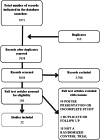Psychosocial Interventions Impact on Cardiometabolic, Neurobiological, Behavioral, and Immune Outcomes in People With a Serious Mental Illness: A Systematic Review
- PMID: 40692574
- PMCID: PMC12277662
- DOI: 10.1002/hsr2.70954
Psychosocial Interventions Impact on Cardiometabolic, Neurobiological, Behavioral, and Immune Outcomes in People With a Serious Mental Illness: A Systematic Review
Abstract
Background and aims: Five and a half percent of the population of the United States has a serious mental illness (SMI). Mind-body outcomes represent a direct and operationalizable measurement associated with accelerated aging. These findings may suggest that psychosocial interventions represent the first-ever strategy to increase the lifespan of people with SMI; however, the literature is limited.
Methods: The patient/population, intervention, comparison, and outcomes (PICO) criteria were used to assess study eligibility in partnership with a master's-level librarian. Studies focused on (1) the general population, which later became a population with SMI, (2) psychosocial intervention vs. no psychosocial intervention, and (3) cardiometabolic, neurobiological, behavioral, and immune outcomes. We searched the following databases from 1946 to January 2024: Medline, PsycINFO, Cochrane Central Register of Controlled Trials, Scopus, and PubMed. Thirty-two RCTs fit the criteria. The Methodological Quality Rating Scale assessed the methodological quality of the included studies. Studies assessed four outcome categories: (1) neurobiological, (2) behavioral, (3) immune, and (4) cardiometabolic.
Results: Immune outcomes were the least recorded but significantly differed between the psychosocial intervention treatment group and controls. Behavioral and neurobiological outcomes significantly differed between the treatment group and controls. Cardiometabolic outcomes were the most studied, with inconsistencies in significant vs. nonsignificant differences between intervention and control.
Conclusion: Evidence is growing that psychosocial interventions can improve the lives of people with SMI and potentially reduce accelerated aging. We suggest that psychosocial intervention randomized control trials with mind-body outcomes may represent a viable strategy for reducing disease burden and improving human health. Additional research is needed to examine the correlation between psychosocial interventions and the effects on mind-body outcomes of accelerated aging and SMI. The present systematic review extends this study by identifying the outcomes associated with accelerated aging significantly modified by psychosocial intervention.
Keywords: cardiometabolic risk factors; immune system; neurobiology; premature aging; psychosocial intervention; severe mental disorder.
© 2025 The Author(s). Health Science Reports published by Wiley Periodicals LLC.
Conflict of interest statement
Karen L. Fortuna has a conflicts of interest with Emissary Health. Paul Holtzhiemer receives royalties from Oxford University Press and UpToDate. The other authors declare no conflicts of interest.
Figures
Similar articles
-
Systemic pharmacological treatments for chronic plaque psoriasis: a network meta-analysis.Cochrane Database Syst Rev. 2021 Apr 19;4(4):CD011535. doi: 10.1002/14651858.CD011535.pub4. Cochrane Database Syst Rev. 2021. Update in: Cochrane Database Syst Rev. 2022 May 23;5:CD011535. doi: 10.1002/14651858.CD011535.pub5. PMID: 33871055 Free PMC article. Updated.
-
Behavioral interventions to reduce risk for sexual transmission of HIV among men who have sex with men.Cochrane Database Syst Rev. 2008 Jul 16;(3):CD001230. doi: 10.1002/14651858.CD001230.pub2. Cochrane Database Syst Rev. 2008. PMID: 18646068
-
Education support services for improving school engagement and academic performance of children and adolescents with a chronic health condition.Cochrane Database Syst Rev. 2023 Feb 8;2(2):CD011538. doi: 10.1002/14651858.CD011538.pub2. Cochrane Database Syst Rev. 2023. PMID: 36752365 Free PMC article.
-
Systemic pharmacological treatments for chronic plaque psoriasis: a network meta-analysis.Cochrane Database Syst Rev. 2017 Dec 22;12(12):CD011535. doi: 10.1002/14651858.CD011535.pub2. Cochrane Database Syst Rev. 2017. Update in: Cochrane Database Syst Rev. 2020 Jan 9;1:CD011535. doi: 10.1002/14651858.CD011535.pub3. PMID: 29271481 Free PMC article. Updated.
-
Shared decision-making interventions for people with mental health conditions.Cochrane Database Syst Rev. 2022 Nov 11;11(11):CD007297. doi: 10.1002/14651858.CD007297.pub3. Cochrane Database Syst Rev. 2022. PMID: 36367232 Free PMC article.
References
-
- NAMI , Mental Health by the Numbers, (April 2023), accessed May 3, 2024, https://www.nami.org/about-mental-illness/mental-health-by-the-numbers/.
-
- Seeman M. V., “Schizophrenia Mortality: Barriers to Progress,” Psychiatric Quarterly 90, no. 3 (2019): 553–563. - PubMed
Publication types
LinkOut - more resources
Full Text Sources


